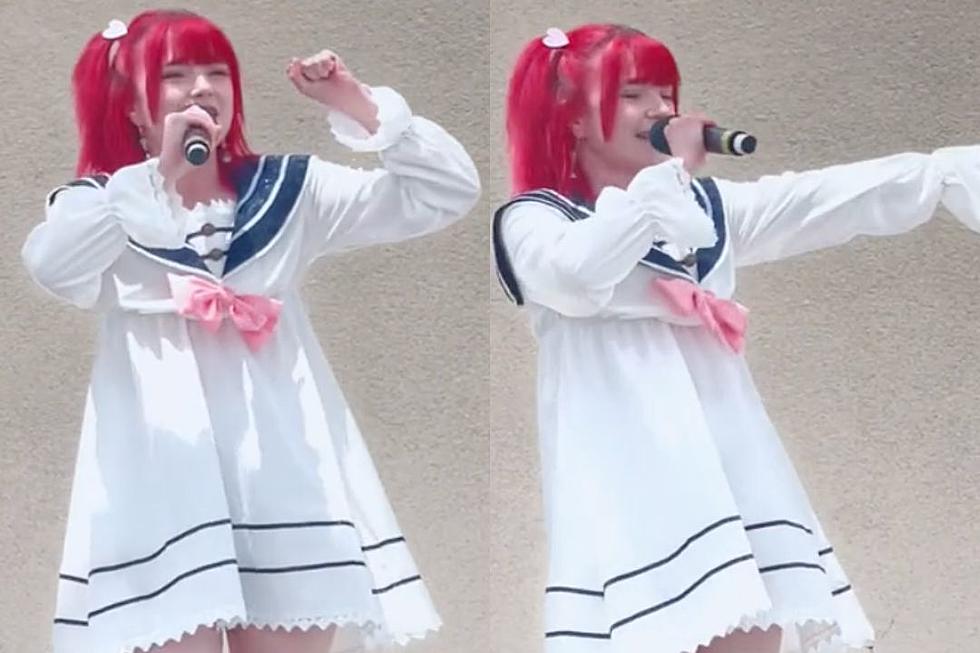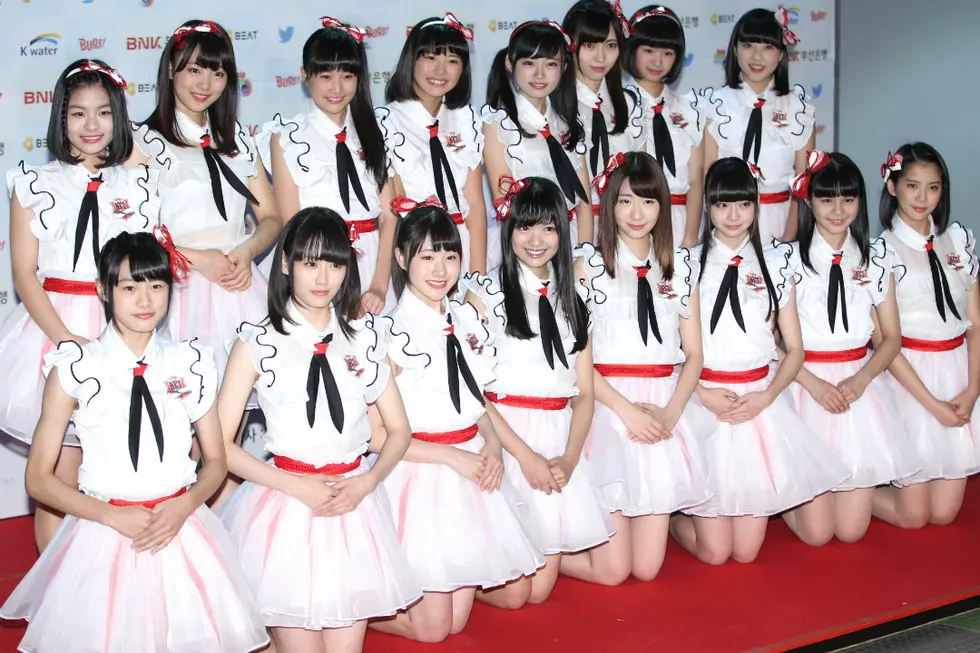
Who Is Utada Hikaru? 20 Songs to Know
Utada Hikaru's sixth Japanese studio album, Fantôme, arrives in mere days — September 28, to be exact. Some are ecstatic. Some are sort of curious from afar. Still others are like "Wait, who?"
This one's for the "Who?" people.
Utada Hikaru (or Hikki, as she's affectionately referred to by fans) is a reigning Japanese pop queen.
Born to Japanese producer Teruzane and enka singer Keiko Fuji in Manhattan (she's fully bilingual, by the way), Utada quickly catapulted to superstardom with the thunderous success of her solo Japanese debut, First Love, released when she was just 16 years old. The album went on to become the highest-selling Japanese album in modern history. Her follow-up record, 2001's Distance, achieved the highest first week sales on any album in history — all the way up until Adele's 25.
As opposed to the shiny, sugary pop styling of her J-Pop contemporaries, Utada quickly made a name for herself as a kind of 'outsider' in the industry because of her singer-songwriter-meets-R&B pop sensibility, notoriously fame-leery attitude, nostalgic lyricism and distinct, quiveringly emotive voice.
Later on in her career, Utada continued to dabble across genres as she increasingly helmed the songwriting and production duties by herself, including the experimental electronica of her 2004 English-language US debut, Exodus. Her first real major crossover moment for fans in the West, however, came in the form of a video game theme song: "Simple & Clean" ("Hikari" in Japan), from 2002's Kingdom Hearts.
After announcing an extended hiatus from the music scene in 2010 following the release of her second greatest hits compilation in order to experience life outside of the public eye, Utada at long last returns in 2016 with Fantôme, her first Japanese studio album in eight years. While we've not heard the full thing just yet, the record, in large part a tribute to her late mother who tragically committed suicide in 2013, promises to be more personal and vulnerable than anything she's recorded before.
There are certain albums (like Ultra Blue) and greatest hits collections (like Singles Collection Vol. 1) that make for good key entry points into Utada's career, but these songs below are some of her most career-defining selections, released across nearly two decades. (And yes, 20 tracks is still just barely scratching the surface.)
Dive in below.
"Automatic"
"Automatic," packaged as a double A-side single with "Time Will Tell," was Utada's official debut released at the end of 1998, and remains one of her best-selling singles to date. Co-produced by her father, it's a solid representation of Utada's early R&B styling — and remains just as damn catchy to this day. It's automatic...
"First Love"
Recorded when she was just 15 years old, "First Love," the title track of her debut, remains one of Utada's most defining and heartbreaking piano-led ballads to this day. Even Boyz II Men covered the song. The lyrics are deeply nostalgic, and uncharacteristically mature for anyone of her age — a Hikki signature. "Our last kiss tasted like tobacco / A bitter and sad smell," the song begins.
"Addicted to You"
Legendary Janet Jackson production duo Jimmy Jam & Terry Lewis worked on the highly infectious, danceable R&B-infused bop "Addicted To You" for Utada, the lead single from her second studio album, Distance. She recorded the track at their Flyte Tyme Studios in Minneapolis. It remains one of the best-selling singles in Japanese history.
"Wait & See (Risk)"
Another Jimmy Jam & Terry Lewis co-crafted R&B-pop bestselling smash, 2000's "Wait & See" saw the singer going the futuristic route for the accompanying, hovercraft-assisted sci-fi music video. Why have one Hikki when you could have three?
"Can You Keep A Secret?"
Released as the final single off of Distance, "Can You Keep A Secret?" soundtracked J-drama Hero and went on to become another smashing success for the pop superstar. The track, which blends melodic R&B grooves and romantic guitar strumming, is also one of many Utada songs that incorporates English hooks. "Hit it off like this, oh baby..."
"Final Distance"
Utada already released the song "Distance" as the title track of her 2001 record. However, upon hearing of the horrifying events that transpired during the Osaka school massacre, during which eight children, including a young fan of Utada, were murdered, she re-recorded the track as "Final Distance," a mournful version in their memory.
"Traveling"
One of her earliest forays onto the dance floor, 2001's "Traveling" sees Hikki, well, going for a ride across propulsive beats and hyper-catchy chants. The futuristic acid trip of a music video is one of her most baffling and carefree — a euphoric fit for the song.
"Hikari" ("Simple & Clean")
Listeners in the West almost surely know her best for 2002's "Simple & Clean" ("Hikari" in Japan), the timeless folky acoustic guitar-meets-electronica theme of Kingdom Hearts. Equally as memorable? The accompanying one-take video, in which she smiles and sings along to the song while washing dishes. Quite literally simple and clean.
"Sakura Drops"
Of all Utada's singles, 2002's Song Of The Year-winning "Sakura Drops" feels like one of her most traditionally Japanese offerings (but with a distinctly modern twist), utilizing the profound beauty found in nature, including cherry blossoms and summer rain, to color her lyrics.
"Colors"
Perhaps as a hint of what was to come on Exodus, Utada's only single released in 2003, "Colors," offered an intriguing shift deeper into the electronica realm and, appropriately, color-coated poetic lyricism. The Golden Disk Award-winning song is also her longest charting single to date.
"Devil Inside"
Utada's 2004 English-language debut, Exodus, was a darker, conflicted, more experimental affair than much of her Japanese music up until that point. "Devil Inside," an ode to inner turmoil and outsider-dom on the dance floor, managed to garner minor chart success upon its release stateside — plus a Queer As Folk cameo.
"Be My Last"
Following the release of her US debut, Utada returned to Japan with blunt bangs and a renewed sound on 2005's "Be My Last," an agonizing, guitar-led plea. Paired with a rather intense music video, it remains one of her most haunting offerings.
"Passion" ("Sanctuary")
Following the massively positive reception to "Simple & Clean"/"Hikari," Utada paired up with the Kingdom Hearts team once again for a sonic sequel. 2005's "Passion" is a bolder, more progressive-sounding ode to the past, present and future, full of thunderous drums, overdriven guitars and lines in English hauntingly played backwards. An English version, "Sanctuary," accompanied the game's Western release.
"Keep Tryin'"
Essentially the sonic equivalent of the Japanese phrase "Ganbatte! ("Do your best!"), the chill, synth-y self-empowerment anthem from Ultra Blue offers both motivation and a charmingly cartoon-ish visual encouraging us all to keep pushing on at our jobs. Just keep tryin'...
"Flavor Of Life"
Utada experienced a massive return-to-form upon the release of her sweeping, cinematic "Flavor of Life" in 2007, a track that went on to become one of the highest selling digital singles of all time in Japan. It helped that the song was released in multiple versions, became an early ringtone smash, and also soundtracked the massively popular J-drama, Hana Yori Dango 2.
"Prisoner of Love"
Serving as the theme for J-drama Last Friends, "Prisoner of Love" went on to become massively popular upon its release as the final single from her fifth Japanese studio album, Heart Station, in 2008. The mesmerizing, string-filled smash, filled wall-to-wall with instant hooks and a backing beat reminiscent of Madonna's "Secret," was written and produced entirely by Utada herself. The accompanying video is a charming look behind-the-scenes of Hikki's creative process working solo and fighting off writer's block in the studio.
"Come Back to Me"
As with Exodus, Utada's second go-around in the US, 2009's Come Back To Me, went relatively unheard by the general public. However, her StarGate co-produced lead single, made minor waves on the charts. As opposed to opting for experimental sound, Utada provided a nod to her early, familiar-sounding R&B style on the singalong-friendly midtempo.
"Goodbye Happiness"
Released in 2010, the self-affirming, live-in-the-moment tone of "Goodbye Happiness" felt especially bittersweet upon its release before starting her hiatus from music. The dorky, self-directed, self-referencing music video basically predicted the explosion of YouTubers in the mainstream years later. Plus, lots of puppets.
"Sakura Nagashi"
Mid-hiatus, Utada very briefly returned in 2012 with a theme song for Evangelion 3.0: "Sakura Nagashi," a track co-crafted with Benbrick (Paul Carter), a songwriter and producer whom she met at a party in England. It's a devastatingly emotional, but ultimately hopeful listen, and the final song on Fantôme.
"Michi"
"Michi" ("Road") is the opening track of Utada's latest record, Fantôme. Upon first listen, the track plays like a club banger. And it is! But a deeper dive into the lyrics reveals a devastating message of perseverance in the face of grief upon losing her mother. "It's a lonely road, but I'm not alone," she ultimately decides. It's a triumph, in both song and spirit.
More From PopCrush









